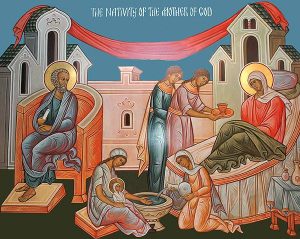 “By Your Nativity, O Most Pure Virgin, / Joachim and Anna are freed from the reproach/disgrace of barrenness; / Adam and Eve, from the corruption of death. / And we, your people, freed from subjection to sin, celebrate and sing to you: / The barren woman gives birth to the Theotokos, the nourisher of our life!”
“By Your Nativity, O Most Pure Virgin, / Joachim and Anna are freed from the reproach/disgrace of barrenness; / Adam and Eve, from the corruption of death. / And we, your people, freed from subjection to sin, celebrate and sing to you: / The barren woman gives birth to the Theotokos, the nourisher of our life!”
(Byzantine Kontakion-hymn of the Nativity of the Theotokos)
The Liturgy for the great feast of the Nativity of Mary is full of theology that we can not walk away from, even if they are difficult theological concepts, like “corruption of death” and “subjection to (liabilty for) sin,” referring to our human state before Christ. The beauty of the poetry here to convey what we believe is stunning: the mention of Jesus Christ annulling our “curse” in another well-known hymn, the Troparion of the feast: “By annulling the curse He bestowed a blessing, by destroying death, He gave us eternal life.” What does it mean for us today?
A key to unlock the importance of this feast is understanding the generation before Mary: Saints Joachim and Anna. These two experienced in their life, in their experience, what the Kontakion above speaks of “disgrace of barrenness” or “chidlessness.” Consider what it means for a woman to experience the inability to conceive, or to experience the death of her infant child. What God did was to free Anna from the paralyzing “barrenness” of her body and give her an incomparable blessing –the gift of Life. With Joachim and Anna, God intervened in human history making it possible for them to “live” to their full potential by giving birth to Mary. Life makes all the difference.
The feast is, as St. Andrew of Crete describes it, “the beginning of feasts. It represents the first of the feasts against the Law and the shadows, yet also the entrance of those that lead to grace and truth.”
The Source of Life in His creative energies allows humans to be truly productive and truly human when it was impossible. So today we honor Mary, but we also honor her parents, Joachim and Anna, “the barren woman gives birth.” THE Good News here is that God the Father bestows the same blessing on the Church. As one theologian said, He continues to bless “an ever God-Bearing Church.”